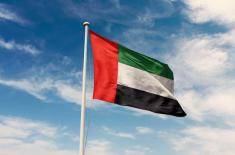
- Home
- Pakistan
- Rising textile pollution endangers marine life, blue economy; says Junaid Anwar Chaudhry
Rising Textile Pollution Endangers Marine Life, Blue Economy; Says Junaid Anwar Chaudhry
Umer Jamshaid Published September 20, 2025 | 07:10 PM

ISLAMABAD, (UrduPoint / Pakistan Point News - 20th Sep, 2025) Federal Minister for Maritime Affairs, Muhammad Junaid Anwar Chaudhry has warned that the rising tide of textile and fashion waste flooding our oceans poses a growing threat not only to marine life but also to economic future, climate resilience, and the well being of future generations.
On World Cleanup Day 2025, which carries the theme “Tackling Textile and Fashion Waste Through Circular Fashion,” he underscored the urgent need for sustainable practices to protect oceans and secure the future for coming generations.
World Cleanup Day is a global initiative focused on combating solid waste and marine debris, highlighting the pressing challenges posed by textile pollution, said a press release issued here Saturday.
The minister stated that the Prime Minister’s firm commitment to prioritizing climate change underscores the urgent need for sustainable policies aimed at protecting environment, economy, and citizens.
“The health of our oceans is directly linked to the well being of our people, economy, and planet. I urge industries, policymakers, and citizens to recognize the dangers of textile and fashion waste and collaborate to build a circular economy that protects both livelihoods and biodiversity,” said Junaid Anwar Chaudhry.
Pakistan’s textile and fashion sector, one of the world’s largest and responsible for nearly 60% of national exports, also generates significant waste and pollution. Studies reveal textile waste contributes heavily to microplastic contamination in rivers and seas, threatening marine life including fish, corals, and vital coastal ecosystems.
Every year, tons of textile waste end up in landfills and waterways that eventually flow into the Arabian Sea. Microfibers from synthetic fabrics are consumed by marine animals, disrupting food chains and placing additional stress on species already threatened by climate change, overfishing, and habitat degradation.
The minister emphasized that the issue extends beyond ecology to economics as Pakistan’s blue economy, encompassing fisheries, shipping, tourism, and coastal industries, suffers major losses due to polluted waters and habitat degradation.
Pollution-related losses in fisheries alone exceed USD 200 million annually, while the potential of coastal tourism remains largely untapped. If this trend continues, financial losses will escalate further. Globally, the fashion industry loses about USD 500 billion annually due to under utilization and lack of recycling. For Pakistan, adopting circular fashion is not only an environmental imperative but also an economic necessity to safeguard these critical sectors.
He also highlighted the link between textile waste and climate change, noting that the textile sector is a major water consumer and greenhouse gas emitter. Discarded textiles in landfills release methane, a potent climate pollutant, worsening global warming impacts on coastal communities already vulnerable to rising sea levels and extreme weather events. Circular fashion, which promotes longer-lasting, reusable, repairable, and recyclable products, provides a pathway to lower emissions, conserve resources, and adapt to climate challenges. This approach is especially vital for Pakistan, a frontline country in the climate crisis facing increasing environmental risks.
“The challenge is too large for government alone. We need public-private partnerships, collaboration with academia, and active citizen involvement. Simple actions like supporting sustainable brands, reducing over consumption, and recycling textiles can collectively make a significant difference,” the Minister emphasized, calling for collective responsibility to protect marine ecosystems, enhance economic resilience, and build a sustainable future for all.
Recent Stories

Gold prices witness increase in Pakistan

President Zardari visits historic Eidgah Mosque in China’s Kashgar

Terror mastermind of Jaffar Express attack killed in Afghanistan

Elderly man killed in Karachi robbery by Armed gang

Floods in Sutlej, Chenab affect 4.7 Million people in Punjab

Field Marshal Syed Asim Munir should be awarded the official title of "Guardian ..

Dubai Customs joins Careers Fair 2025 to champion Emirati talent

Federal Minister for Overseas Pakistanis and Human Resource Development Chaudhry ..

Ex-Federal minister Dr. Waqar Masood passes away

Govt eases RLNG connections for consumers with paid demand notices

Data of 300,000 Hajj applicants found on dark web

UAE marks International Day of Peace with leading role in crisis resolution, sta ..
More Stories From Pakistan
-
AC visits special school
2 minutes ago -
PSMA urges govt to allow sugar sale in market
2 minutes ago -
Rising textile pollution endangers marine life, blue economy; says Junaid Anwar Chaudhry
12 minutes ago -

President Zardari visits historic Eidgah Mosque in China’s Kashgar
12 minutes ago -
GtCCI holds orientation session for new members
22 minutes ago -
President Zardari visits Kashgar Free Trade Zone
22 minutes ago
-
Commissioner dispatches relief consignment for flood victims
22 minutes ago -
Humidity persists in Lahore
22 minutes ago -
Commissioner reviews flood damage estimates, anti-dengue efforts
32 minutes ago -
RPO opens new police station building
32 minutes ago -
ANF launches major crackdown, 129kg of drugs seized, six arrested in nationwide operations
32 minutes ago -

Terror mastermind of Jaffar Express attack killed in Afghanistan
36 minutes ago

